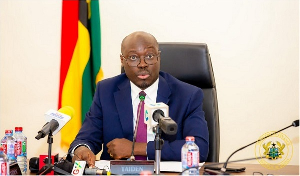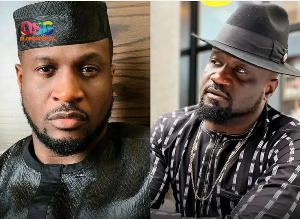By Kwame Okoampa-Ahoofe, Jr., Ph.D.
Long before the emergence of the current global debate over Chinese domination of the postcolonial African economy, illusory or non-illusory, Busia had deftly and presciently deciphered the imperialistic angling for Africa’s political domination between Beijing and Moscow. Undergirding both mega-polities’ ideological chicanery, which largely revolved around petty questions over either a negotiated or revolutionary overthrow of the stranglehold of Western capitalist economic and political culture in Africa, was a clearly disingenuous attempt by both China and the erstwhile Soviet Union to give an unrealistic procedural pass over Africa’s economic advancement towards full-fledged capitalism on the Marxist-Leninist road to socialism and communism, respectively. Of course, Busia clearly recognized the intrinsically propagandistic essence of the bulk of Soviet Africanist scholarship vis-à-vis the contingent emergence and dominance of socialism in the newly liberated African states: “At the Fourth People’ Solidarity Conference held in Winneba, Ghana, in May 1965, the Chinese were able to get the Conference to condemn ‘peaceful coexistence ‘ as a completely unsuitable way of gaining progress for national liberation movements. The Chinese put forward the view that whoever negotiated with the imperialists was supporting ‘peaceful coexistence,’ and whoever did that was an ally of imperialism. Instead of disarming, the new States were urged to strengthen their defenses and build up a revolutionary organization. The question is whether the Communist victory, assumed as inevitable, is to come by armed struggle or by negotiation. Is the Soviet advocacy of negotiation only a ruse? Which side is correctly interpreting the Marxist-Leninist doctrine? Each side claims that the other is departing from the true path. The ideological dispute is part of a battle between the two countries for hegemony. Their policies aim at the eventual triumph of Communism in Africa, and indeed the world [at large]; but is it to be under the leadership of the Soviet Union or China? ¶ Since their rivalry came into the open in the autumn of 1959, the Soviet Union and China have followed different policies in Africa, and the Communist case has been clouded by their rival claims and propaganda and inherent contradictions. They both teach that in order to achieve full independence and democracy, the African countries must attain economic independence, and that the only way to do this is to follow the non-capitalist path by developing economic and cultural ties with Communist countries. The Soviet Union points to its own achievements, and sets itself up as the model to be followed; while China maintains that it is the Chinese example which is more [relevant and] appropriate to the condition of the developing countries of Africa, and that the Russian model calls for higher levels of technology than Africa possesses at present. ¶ Industrial development and modernization call for big capital which the new African States do not possess. They therefore require capital investments from outside. But Soviet propaganda warns them against receiving capital from the Western European countries or America. It is argued that they are imperialists who are willing to help only because they wish to exploit Africa’s need for capital in order to impose a more dangerous form of domination – neocolonialism. ¶ Thus Nigerians were told by Soviet experts that Western aid was a variant of neocolonialism which threatened Nigeria’s economic emancipation. It was to the socialist system and the socialist countries that they should look for aid which would ensure freedom. The Soviet construction of the metallurgical works at Blulai in India and the Aswan High Dam in the UAR were cited as examples of disinterested Soviet aid”(Africa in Search of Democracy 66-68).
The most risible aspect of the preceding Eastern political game at the expense of a wild-eyed newly independent Africa at the crossroads, as Africa’s foremost social thinker of the twentieth century would shortly point out, is the stark and ironic fact that 85-percent of foreign investment capital in Africa still came from the “imperialist” West, and predictably from countries like Britain, the erstwhile West Germany, the United States and France. In other words, as Busia implicitly narrates the same, the Chinese and the Russians found it far more affordable to insult the intelligence of a clearly bemused African leadership than match their pontifical rhetoric with significant economic development assistance (See statistical data on East-West capital investment in Ghana for the 5-year period between 1959 and 1964 – Africa in Search of Democracy 83).
Likewise, it has often been argued that, for the most part, China has maintained an insular, hands-off diplomatic and foreign-policy approach in postcolonial Africa. Busia effectively demonstrates such line of reasoning to be forensically devoid of merit and even downright naïve, to speak much less about the fatally ignorant: “It should be noted that China has supported militant, anti-imperialist movements in Algeria, Cameroon, Morocco, Guinea, and the Congo. It has also been reported that the Chinese have trained soldiers in Zanzibar, on the [Mozambican] border, outside Brazzaville, and in the guerilla academies in Peking to carry out subversion and revolution in Africa. Since Chou En-lai’s speech, warnings against subversive activities by China have been given by Niger, Zambia, and Kenya; the revolution in the Congo[,] led by men trained and armed by China[,] has been quelled; Chinese Communists have been turned out of Burundi; and in the Malawi Parliament, Dr. Banda has charged that the Chinese ambassador in Dar-es-Salaam has ‘the steering hand’ in subversive activities directed at his country. There has been mounting evidence that China is carrying out a campaign of subversion as a matter of policy. ¶ At the same time, she has pursued another policy – a campaign through diplomacy, technical aid, loans, and cultural exchanges to win the friendship and support of African countries for her policies and for the Communist ideology. She has given long-term interest-free loans which she ties to her own imports, and to project she must approve; consequently, not all the loans are in fact taken up by the governments to which they are offered, but the announcement of the loan has its propaganda value all the same. ¶ Economic and technical cooperation agreements, including loans, have been made with Algeria, Ghana, Guinea, Kenya, Mali, Somalia and Tanzania. Chinese official missions of traders, technicians, as well as troupes of acrobats visit one African country or another every year. Chinese experts are teaching Africans to grow rice or other crops in various African countries, such Guinea, Mali, the Central African Republic, Libya, and Dahomey; and there are Chinese engineers and medical teams in Tanzania and Somalia. China’s efforts to establish good relations with African countries have also included the exchange of visits and delegations, and the training of African students in China. ¶ But the Soviet Union’s economic aid and technical assistance to African countries, her cultural exchanges and facilities for the training of African students have all been on a larger scale than China can afford, and have covered more African countries. Chinese investment in radio and published propaganda has, however, been on a grand scale, and as part of the war between her and the Soviet Union for leadership of the Communist world, and for the control of Africa, she has represented Soviet activities in the fields she cannot rival as part of the policy of ‘peaceful coexistence’ which the ‘white’ Soviet Union is carrying out as an ally of the ‘imperialists,’ against the real interests of colored peoples, at the head of which China places itself”(Africa in Search of Democracy 70-71). Earlier on, Busia cites Mr. Chou En-lai, one of the key architects of the Maoist revolution, to be advocating a philosophy of “Second Degree” revolutions in the newly independent African states, which the author of Africa in Search of Democracy interprets to imply the imperative need to thoroughly rooting out “the traditional authorities and new elites who now rule Africa,” in order to guarantee the functional perfection of the new socialist dispensation (69-70).
Busia also proves those latter-day critics of China’s current oil-grab ventures on the African continent to be at least a full-half century behind in their eerie recognition of What Tanzania’s President Julius K. Nyerere in the early 1960s aptly and poignantly characterized as the “Second Scramble for Africa” by the Eastern-bloc countries, notably the erstwhile Soviet Union and China: “Tanzania has accepted aid from China, and the Zanzibar[i] half of it has been under strong Chinese Communist influence; but President Nyerere of Tanzania has warned against a ‘second scramble for Africa’ between Russia and China for the exploitation of the continent; and Dr. Banda of Malawi has added that the scramble is ‘for the soul of Africa’ and constituted a grave menace. ¶ Neither the Soviet nor the Chinese version of Communist ideology, confused by their rivalry, charges and counter-charges, and contradictions, nor the new theories or contortions to meet the challenges of African social realities, or placate African critics have won the wide support that the Communists have claimed. During the year 1965[,] warnings given by the Presidents of the Ivory Coast, Upper Volta, Niger, Kenya, and Malawi against the dangers of Communism have shown their concern about the threat of Communist subversion to the stability and progress [of] their States, rather than sanguine hopes for contributions from Communist ideology to democracy” (Africa in Search of Democracy 73-74). This, however, is in no way to imply that either China or Russia has not learned any better over the decades, or matured in its attitude and/or policies towards an increasingly sophisticated African continent and its leadership and peoples. Nevertheless, the recent construction and rather magnanimous gifting of the African Union (AU) edifice in the Ethiopian capital of Addis Ababa may yet point to the determined efforts of Beijing not to be left behind by the traditional Western-European beneficiaries of Africa’s mineral wealth and other natural resources. Then also, the flamboyant installation of the life-size statue of modern Ghana’s infamous tyrant and one-party dictator, Mr. Kwame Nkrumah, may yet point to the vexatious fact of China not having given up its long-known and suspected ambition of making a satellite outpost of postcolonial Africa, the apparent goodwill nature of such largesse notwithstanding. What is edifyingly clear, however, is the fact that both China and Russia appear to have humbly, if also wisely, come to terms with the yawning deficiency of their Communist ideologies. It is, of course, tragically ironic that President Nyerere would later embark on a decidedly fore-doomed policy project of Ujamaa (familyhood), his own purportedly African brand of socialism: “Soviet and Chinese organizational methods have an appeal in Africa, for all the African countries want rapid industrialization and modernization, and both countries can point to achievements which are impressive. In their search for effective techniques to raise the standards of living of their peoples, some African leaders have turned to the Soviet Union and China, and have sought to copy Communist methods, while rejecting its ideology. But we must ask whether the methods lead to the extension of freedom and democracy, or to its curtailment. One may recall the years between 1929 and 1939, when the Soviet policy of rapid industrialization, and particularly the drive to increase the production of steel, involved the instruments of the secret police to control the population, the building up of a vast bureaucracy, forced labor camps, false trials and massacres. These are facts which have been admitted by the Soviet authorities themselves in the ‘De-Stalinization’ campaign. But a probing of such methods discloses the nature of Communist democracy. The Chinese drive for rapid industrialization has been accompanied by similar methods and instruments. Communist methods and ideology have little to offer those countries which seek development in freedom”(Africa in Search of Democracy 74).
Busia also presents the reader with, perhaps, the most eloquent and comprehensive definition of “African Socialism,” one that clearly and wisely distinguishes itself from the Marxist-Leninist textbook approach to socialism: “African socialism is a compound of several ingredients. It compounded of reactions to colonialism, capitalism, Marxist-Leninist doctrine, combined with the search for economic development, national sovereignty, democratic freedom and internationalism, and from roots in African tradition and culture. It is therefore not surprising that we should have different admixtures of the various elements to give us different brands of African socialism. ¶ To begin with, the various brands all hark back to the solidarity of traditional society. In its Sessional Paper on African Socialism, the Kenya Government was at pains to point out that the word ‘African’ had been introduced to convey ‘the roots of a system that is itself African in its characteristics.’ The roots were found in ‘two African traditions which form an essential basis for African socialism – political democracy, and mutual social responsibility.’ The first ‘implies that each member of society is equal in his political rights, and that no individual or group will be permitted to exert undue influence on the policies of the State’; and the second ‘implies a mutual responsibility by society and its members to do their very best for each other with the full knowledge and understanding that if society prospers its members will share that prosperity, and that society cannot prosper without the full cooperation of its members.’ ¶ This sense of community and solidarity of traditional African society runs through the various concepts of African socialism. It is the main plank of President Nyerere’s concept of socialism as outlined in ‘Ujamaa – the basis of African socialism,’ an address he gave at Kivukoni College in Dar-es-Salaam in 1962. ¶ He states that African socialism[:] ‘rooted in our own past – in the traditional society which produced us. Modern African socialism can draw from its traditional heritage the recognition of ‘society’ as an extension of the family unit.’ ¶ [A]nd he sees socialism essentially as an ‘attitude of mind,’ and ¶ ‘our first step, therefore, is to reeducate ourselves; to regain our former attitude of mind. In our traditional African societ[,] we were individuals within a community. We took care of the community, and the community took care of us. We neither needed, nor wished to exploit our fellow men.’ ¶ The same emphasis on the traditional sense of community appears in President Senghor’s concept of African socialism. In his speech at Oxford[,] already referred to, he states: ¶ ‘Thus [in] the working out of our African mode of socialism, the problem is not how to put an end to exploitation of man by his fellow, but to prevent it ever happening, by bringing political and economic democracy back to life; our problem is not how to satisfy spiritual, that is, cultural needs, but how to keep the fervor of the black soul alive.¶ The solidarity of African society was the fire to be rekindled” (Africa in Search of Democracy 75-77). In Ghana, the kind of socialism propounded and advocated by the government of the Convention People’s Party appeared to be characteristically contradictory. On the one hand, The Spark, the pro-CPP newspaper, fanatically preached the Marxist orthodoxy of class struggle, whereas Nkrumah’s own pseudo-philosophical treatise, Consciencism, sought to synergize his classless brand of African socialism with pan-Africanism, an indisputably undemocratic campaign for the unconditional unification of the African continent into a one-party super-state under the peremptory political domination of the “Osagyefo,” as hinted by Busia in a collection of his speeches titled The Courage and Foresight of Busia (1969): “In conformity with orthodox doctrine, The Spark could not conceive of socialism without a class struggle. If in this it propounded the policy of the Government of Ghana, then the policy had changed by 1964, for Consciencism[,] published that year, shows that Nkrumah’s Marxist socialism accepted the communalism of traditional African society to be the foundation of his brand of socialism; he denied the existence of classes, and rejected the class struggle, and the inevitability of revolution. But there was a shift of emphasis on Pan-Africanism as an indispensable ingredient of his socialism. He has the Trotsky conception that socialism cannot succeed unless it embraces the whole continent of Africa. That the political kingdom comes first is reflected in this conception, the instruments of which, as advanced, should be a single continental party as the vanguard of socialism. No other African country supports this concept of socialism”(Africa in Search of Democracy 79-80). *Kwame Okoampa-Ahoofe, Jr., Ph.D., is Associate Professor of English, Journalism and Creative Writing at Nassau Community College of the State University of New York, Garden City. He is Director of The Sintim-Aboagye Center for Politics and Culture and author of “Danquah v. Nkrumah: In the Words of Richard Mahoney,” a forthcoming volume of short essays. E-mail: okoampaahoofe@optimum.net. ###
Opinions of Thursday, 29 March 2012
Columnist: Okoampa-Ahoofe, Kwame














